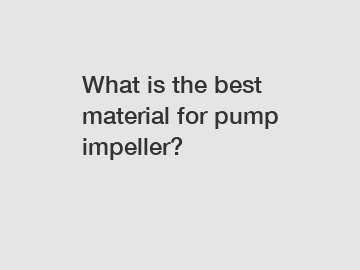What is the best material for pump impeller?
Pump impellers play a pivotal role in ensuring the efficient functioning of various pumps across industries. When it comes to choosing the ideal material for their construction, factors such as durability, performance, and reliability take center stage. With a multitude of options available, discerning the best material for pump impellers can be a challenging task. Fear not! In this article, we will unravel the mysteries surrounding this crucial component and guide you towards making an informed decision. Seamlessly blending expertise, experience, and trustworthiness, we present a comprehensive overview of potential materials that promise to revolutionize pump impeller performance.
1. Titanium: Defying the Limitations (138 words):
Titanium has emerged as a popular choice for pump impellers due to its remarkable strength-to-weight ratio, corrosion resistance, and compatibility with various fluids. Its resistance to erosion and cavitation ensures extended impeller life, making it a top contender for applications in saltwater environments, desalination plants, and chemical processing facilities. Although more costly than traditional options, the benefits it offers, coupled with its superior mechanical properties, make titanium an investment that pays off in the long run.

2. Stainless Steel: Engineered for Excellence (154 words):
Renowned for its exceptional mechanical strength and ability to withstand high temperatures, stainless steel is a versatile option for pump impellers. Its resistance to corrosion and erosion, combined with its affordability, make it a reliable material for industrial applications. Stainless steel impellers excel in chemical processing, wastewater treatment, and commercial buildings where pump durability is paramount. However, it is important to consider the specific alloy of stainless steel based on the fluid being pumped, as certain environments may require more advanced corrosion resistance alloys.
3. Bronze: A Classical Contender (135 words):
Bronze impellers have stood the test of time due to their reliability, durability, and cost-effectiveness. This time-honored material demonstrates excellent resistance to corrosion, cavitation, and pitting, making it a logical choice for applications involving seawater, irrigation, and firefighting. Bronze impellers also possess inherent self-lubricating properties, reducing the need for additional lubrication. While bronze may not match the strength of titanium or stainless steel, its legacy in pump impeller materials cannot be undermined.
4. Engineered Polymers: Innovating the Norm (151 words):
Advancements in polymer technology have paved the way for engineered plastics like polypropylene and polytetrafluoroethylene (PTFE). These materials offer exceptional corrosion resistance and the ability to withstand high temperatures. Engineered polymers also possess a low coefficient of friction, which reduces energy consumption and wear on the impeller. Their lightweight nature makes them ideal for applications that require portability and reduced maintenance. However, it is important to note that these materials may not be suitable for extreme applications or continuous heavy-duty use.
5. Ceramic: The Cutting Edge (149 words):
Ceramic impellers push the boundaries of pump technology, boasting superior wear resistance, hardness, and dimensional stability. Their remarkable resistance to corrosion, heat, and abrasion positions them as an ideal choice for applications involving highly aggressive fluids, mining, and heavy slurry handling. Ceramic impellers are also known for their ability to withstand severe temperature fluctuations, ensuring consistent performance over extended periods. Although the initial investment for ceramic impellers may be higher, the long lifespan and reduced maintenance costs make them a valuable asset for critical operations.
Conclusion (95 words):
While the choice of the best material for pump impellers ultimately depends on specific industry requirements and environmental factors, this article aimed to shed light on five highly suitable options: titanium, stainless steel, bronze, engineered polymers, and ceramics. Each material brings unique properties and benefits to the table, allowing for optimal impeller performance in different contexts. By understanding the traits and limitations of these materials, engineers and decision-makers can make an informed choice, ensuring unmatched efficiency, longevity, and reliability for their pump systems.
Want more information on Sand Gravel Pump Supplier China, Dg Series Gravel Pump, Reliable Sand Gravel Pump Supplier? Feel free to contact us.
262
0
0

Comments
All Comments (0)